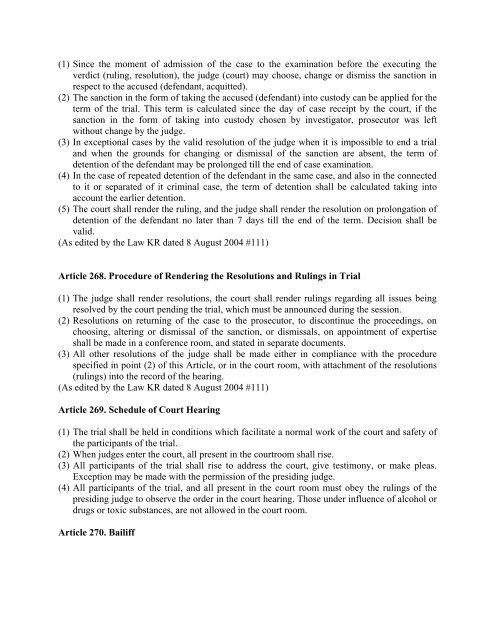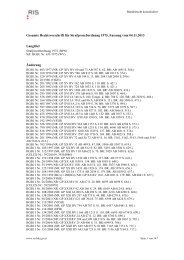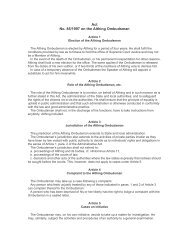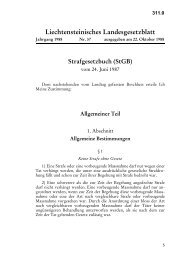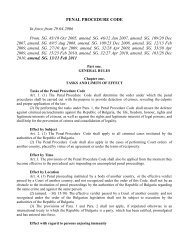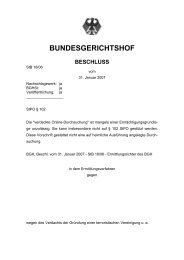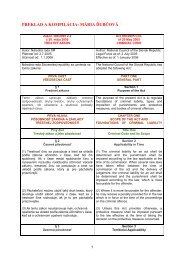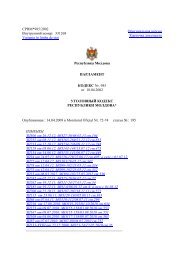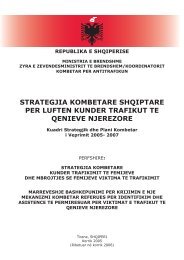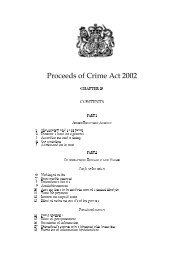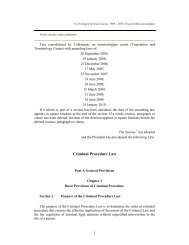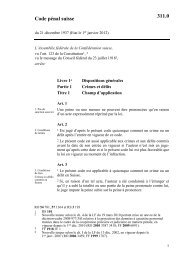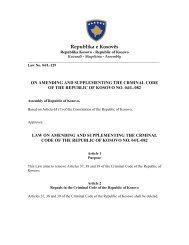Criminal Procedure Code of the Kyrgyz Republic - Legislationline
Criminal Procedure Code of the Kyrgyz Republic - Legislationline
Criminal Procedure Code of the Kyrgyz Republic - Legislationline
Create successful ePaper yourself
Turn your PDF publications into a flip-book with our unique Google optimized e-Paper software.
(1) Since <strong>the</strong> moment <strong>of</strong> admission <strong>of</strong> <strong>the</strong> case to <strong>the</strong> examination before <strong>the</strong> executing <strong>the</strong><br />
verdict (ruling, resolution), <strong>the</strong> judge (court) may choose, change or dismiss <strong>the</strong> sanction in<br />
respect to <strong>the</strong> accused (defendant, acquitted).<br />
(2) The sanction in <strong>the</strong> form <strong>of</strong> taking <strong>the</strong> accused (defendant) into custody can be applied for <strong>the</strong><br />
term <strong>of</strong> <strong>the</strong> trial. This term is calculated since <strong>the</strong> day <strong>of</strong> case receipt by <strong>the</strong> court, if <strong>the</strong><br />
sanction in <strong>the</strong> form <strong>of</strong> taking into custody chosen by investigator, prosecutor was left<br />
without change by <strong>the</strong> judge.<br />
(3) In exceptional cases by <strong>the</strong> valid resolution <strong>of</strong> <strong>the</strong> judge when it is impossible to end a trial<br />
and when <strong>the</strong> grounds for changing or dismissal <strong>of</strong> <strong>the</strong> sanction are absent, <strong>the</strong> term <strong>of</strong><br />
detention <strong>of</strong> <strong>the</strong> defendant may be prolonged till <strong>the</strong> end <strong>of</strong> case examination.<br />
(4) In <strong>the</strong> case <strong>of</strong> repeated detention <strong>of</strong> <strong>the</strong> defendant in <strong>the</strong> same case, and also in <strong>the</strong> connected<br />
to it or separated <strong>of</strong> it criminal case, <strong>the</strong> term <strong>of</strong> detention shall be calculated taking into<br />
account <strong>the</strong> earlier detention.<br />
(5) The court shall render <strong>the</strong> ruling, and <strong>the</strong> judge shall render <strong>the</strong> resolution on prolongation <strong>of</strong><br />
detention <strong>of</strong> <strong>the</strong> defendant no later than 7 days till <strong>the</strong> end <strong>of</strong> <strong>the</strong> term. Decision shall be<br />
valid.<br />
(As edited by <strong>the</strong> Law KR dated 8 August 2004 #111)<br />
Article 268. <strong>Procedure</strong> <strong>of</strong> Rendering <strong>the</strong> Resolutions and Rulings in Trial<br />
(1) The judge shall render resolutions, <strong>the</strong> court shall render rulings regarding all issues being<br />
resolved by <strong>the</strong> court pending <strong>the</strong> trial, which must be announced during <strong>the</strong> session.<br />
(2) Resolutions on returning <strong>of</strong> <strong>the</strong> case to <strong>the</strong> prosecutor, to discontinue <strong>the</strong> proceedings, on<br />
choosing, altering or dismissal <strong>of</strong> <strong>the</strong> sanction, or dismissals, on appointment <strong>of</strong> expertise<br />
shall be made in a conference room, and stated in separate documents.<br />
(3) All o<strong>the</strong>r resolutions <strong>of</strong> <strong>the</strong> judge shall be made ei<strong>the</strong>r in compliance with <strong>the</strong> procedure<br />
specified in point (2) <strong>of</strong> this Article, or in <strong>the</strong> court room, with attachment <strong>of</strong> <strong>the</strong> resolutions<br />
(rulings) into <strong>the</strong> record <strong>of</strong> <strong>the</strong> hearing.<br />
(As edited by <strong>the</strong> Law KR dated 8 August 2004 #111)<br />
Article 269. Schedule <strong>of</strong> Court Hearing<br />
(1) The trial shall be held in conditions which facilitate a normal work <strong>of</strong> <strong>the</strong> court and safety <strong>of</strong><br />
<strong>the</strong> participants <strong>of</strong> <strong>the</strong> trial.<br />
(2) When judges enter <strong>the</strong> court, all present in <strong>the</strong> courtroom shall rise.<br />
(3) All participants <strong>of</strong> <strong>the</strong> trial shall rise to address <strong>the</strong> court, give testimony, or make pleas.<br />
Exception may be made with <strong>the</strong> permission <strong>of</strong> <strong>the</strong> presiding judge.<br />
(4) All participants <strong>of</strong> <strong>the</strong> trial, and all present in <strong>the</strong> court room must obey <strong>the</strong> rulings <strong>of</strong> <strong>the</strong><br />
presiding judge to observe <strong>the</strong> order in <strong>the</strong> court hearing. Those under influence <strong>of</strong> alcohol or<br />
drugs or toxic substances, are not allowed in <strong>the</strong> court room.<br />
Article 270. Bailiff


